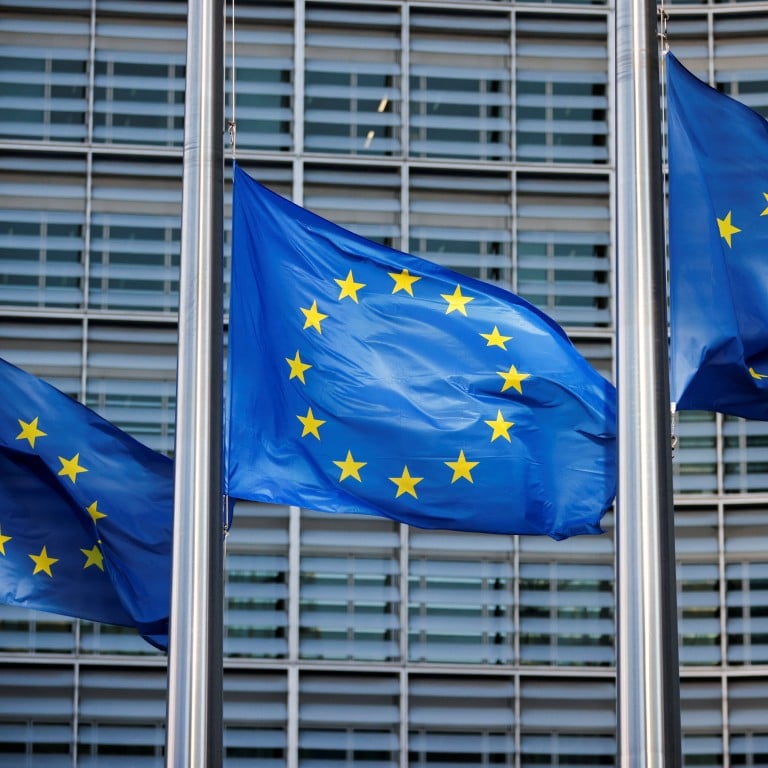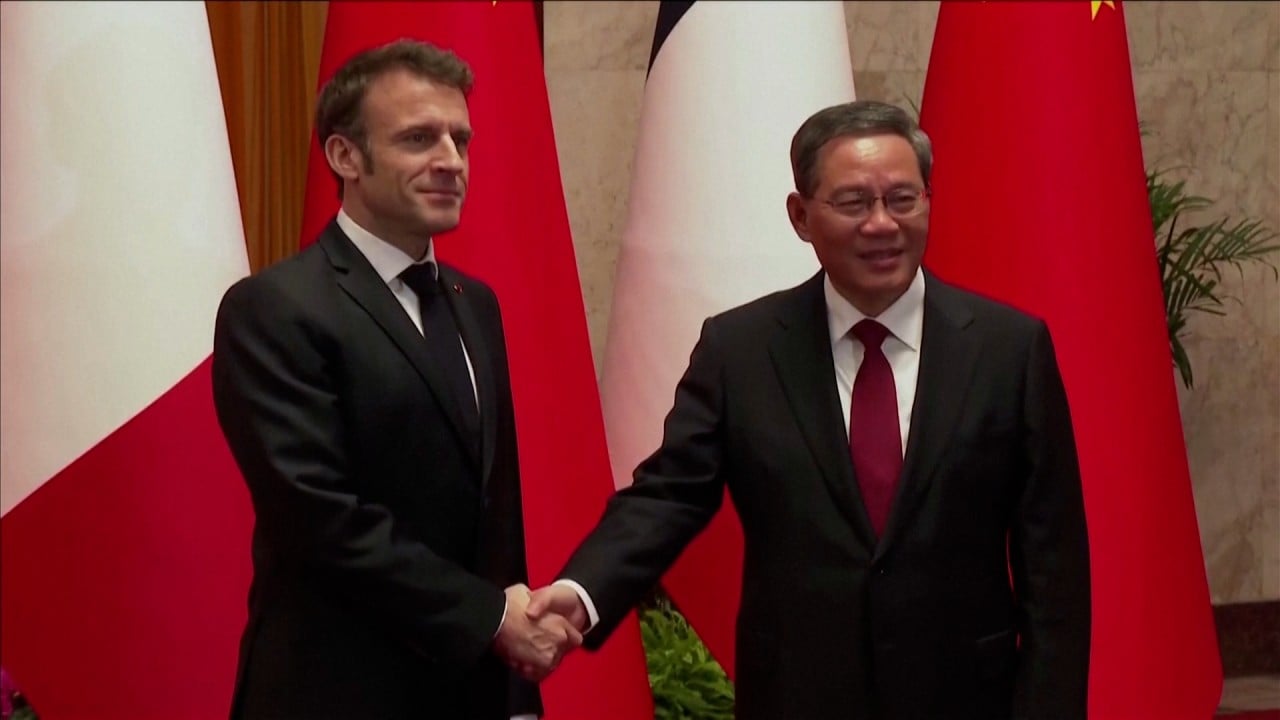
Czech foreign minister calls for more united EU-US approach to China
- Jan Lipavsky intervenes in Europe debate to remind bloc that it needs Washington’s cooperation more than Beijing’s
- While Brussels ponders strategy, Central and Eastern European countries are taking a more assertive approach towards Beijing
In an interview with the South China Morning Post, Jan Lipavsky said the EU “has to cooperate with the US, much more than [with] China”.
Some parts of the bloc – notably France and Germany – have sought to create distance with some of Washington’s more hawkish policies and prefer to view China policy through a broadly economic lens.
A paper commissioned by the EU’s top diplomat Josep Borrell and debated by EU members this month, said the bloc “should not subscribe to an idea of a zero-sum game whereby there can only be one winner, in a binary contest between the US and China”.
But Lipavsky is a prominent voice in a caucus of Central and Eastern European countries that looks to Washington as a guarantor of their national security.

The grouping has adopted a more assertive approach towards Beijing – particularly since Russia’s invasion of Ukraine last February. Some of those governments were annoyed at the level of engagement prescribed by Borrell’s paper.
“Tell me where a country stands on the United States and I know what it will say about China,” said Tim Ruhlig, an analyst at the German Council on Foreign Relations, in a recent blog post.
“Central and Eastern European countries yearn for US security guarantees because of Russia,” he said.
Since coming to office in late 2021, Lipavsky’s government has become one of Europe’s most vocal critics of China and strongest supporters of Taiwan. It has been described as a return to the “Havelian” outlook of the past – in reference to former president Vaclav Havel – with democracy and human rights at the core of foreign policy.
Prague’s position among Europe’s most hawkish was confirmed in January when former Nato general Petr Pavel won the presidential election to replace Milos Zeman, who nurtured close ties to Beijing during a decade in office.
Czech president-elect risks Beijing’s anger with Taiwan phone call
One of Pavel’s first steps was to call Taiwanese counterpart Tsai Ing-wen. Pavel last month said China could not be a peacemaker, because it benefits from a prolongation of war in Ukraine.
Lipavsky concurs. “China definitely benefits from any weakening of Russia, that is definitely for the benefit of China. I think it’s obvious why,” he said. Asked to elaborate, he said that with a weak Russia, “there are more possibilities for China, for example, to have influence in Central Asia”.
“I am praising China for their stance on nuclear security. And for the clear statement on the Zaporizhzhia nuclear power plant … but I don’t see that China is proposing a real plan,” he said, referring to Beijing’s 12-point position paper for peace in Ukraine. “So I will definitely stick to the Zelensky plan.”
Others in Europe – notably, again, in the West – hold more hope of China acting constructively over Ukraine.
China’s Ukraine peace plan: what does it say and can it work?
A Chinese peace envoy is currently touring western Europe, after stops last week in Kyiv and Warsaw, where he was told in both capitals that Beijing’s peace plan would not cut the mustard.
“Ukraine’s peace proposal, the 10-point proposal, is much more favourable, much more in line with the European approach and with international law because it entails, first of all, the respectful internationally recognised borders,” said Pawel Jabłonski, Poland’s undersecretary for state.
But despite this, Lipavsky said EU members are becoming more aligned on what challenges China brings, even if they disagree with how to respond.
EU warned to get its story straight on China, amid ‘divide and conquer’ fears
“Maybe we don’t have a unified position on the solution. But definitely, we are closing significantly in on the description of reality,” he said, when asked about foreign ministers’ talks on China in Stockholm earlier this month.
“The whole Western civilisation is asking this question, how to deal with the rising power of China?” Lipavsky said in Brussels. “China’s vision for their world order definitely is not fully compatible with our vision for multilateral order, based on the rule of law.”
He downplayed the fallout of French President Emmanuel Macron’s insistence that Europe should not follow the US into a potential conflict in Taiwan.
“It was a French ship which went through the Taiwan Strait, if I’m right. So we have to understand that security in Europe and in Asia cannot be separated. It shows that the biggest countries in Europe do understand.”
EU and US officials will meet next week – also in Sweden – for the latest installation of their Trade and Technology Council. They are expected to flesh out further cooperation on export controls and sanctions circumvention.
On the latter front, Brussels has trained its sights on Chinese companies it accuses of contravening EU sanctions by re-exporting to Russia goods made in the EU that are banned from being sold to Russian firms.
A more controversial proposal – on which EU members are yet to agree – would permit Brussels to ban the shipment of these goods to countries in which companies are found to flout EU sanctions.
Lipavsky said Prague is on board with punishing countries that undermine Western efforts to stifle Russia’s military. “That is how the sanctions regime works, the idea is to prevent Russia from being able to wage war.”
EU to weigh sanctions on Chinese firms accused of helping Russian military
But there are limits, it seems, to how far the Czech Republic is planning to push Beijing. According to Lipavsky, there are no imminent plans to leave China’s economic grouping with other countries in Central and Eastern Europe, even though he has described it as “dead”.
The group was called 17+1 until Lithuania left in 2021. The departures of Baltic nations Estonia and Latvia brought it down to 14, and many expect Prague to be the next out the door.
“If it was up to me I would recommend leaving this group. We should have done it already, but it’s not up to me. It’s the decision which must be made by the government, but I think that we are slowly approaching it,” said Petr Kolar, foreign policy adviser to Pavel, in a recent interview in Prague.
Lipavsky, however, said that “we have quite a clear position on that and I don’t see an urgency to change it currently”. He added that Prague has “downplayed” its activity in the format and is “scrutinising” its membership of the group in line with a broader review of China strategy.
Ukraine war clouds picture for China’s central and eastern European trade expo
The position has led to some criticism domestically, where analysts have noted “discrepancies” between tough rhetoric on China and concrete policies.
“The current coalition feels it needs to prioritise and does not see ‘opening a second front’ with China while dealing with Russia’s invasion to Ukraine, as a wise move,” said Ivana Karaskova, an expert on China’s influence in Central Europe and a policy adviser to EU commissioner Vera Jourova on the same topic.
“Hence you see a discrepancy between the rhetoric of the currently ruling coalition on issues such as exit from 14+1 before and after the election.”


